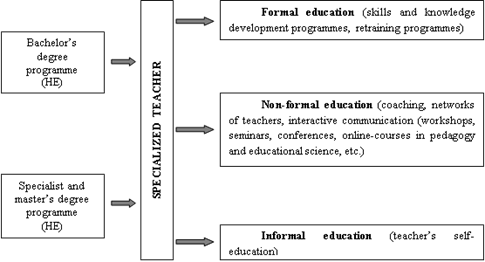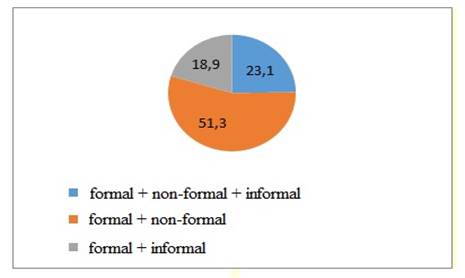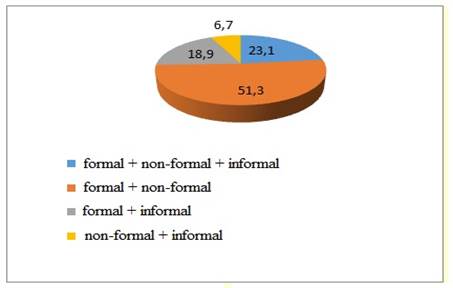Abstract
The relevance of the research is determined by the need to study the right way to develop an individual educational road map by a teacher. The article presents the analysis results of teachers’ skill to develop an individual road map of continuing education in order to improve their professional competence and to ensure Russian education competitiveness. The problem of the research is reflected by the contradiction in stable increasing of the teacher’s interest in continuing teacher training and inability of teachers to develop their individual educational road map. The current research was undertaken to study modern teachers’ skill to develop an effective continuing education road map through their entire career for professional self-realization. The main research methods used are theoretical ones, since they provide the opportunity to reflect the true situation concerning the ability of a teacher to develop continuing education road map taking into account the capacities of the formal, non-formal and informal education. The article presents the analysis of the current state of teacher’s understanding and ability to develop an effective individual road map of continuing education. The results show that it is necessary to improve teacher’s skills in developing individual road map of the continuing postgraduate education. The overview of the research issue is oriented to the study of teacher’s ability to develop individual continuing education road map improving their professional competence. The results show that textbooks and teaching methods in the sphere of formal postgraduate teaching training should be written.
Keywords: Continuing education, road map, formal, non-formal, informal education, professional competence
Introduction
Development of the modern world is under global changes, which are very dynamic and irreversible. This fact leads to the necessity of the continuous upgrading of educational programmes content at all educational levels and in all areas of human activities in order the educational system to be competitive. However, the education content upgrading will be effective if continuing teacher training takes place throughout whole professional activity.
The National Project “Education” involves Russian education competitiveness, teaching staff training for this competitive education, their retraining and advanced training. The Federal Project “Teacher of the Future”, as a part of the national project, provides for the national system of professional growth, enhancing professional excellence of teachers, establishing of a continuing professional development network. The Federal Project “New Opportunities for Everyone”, as a part of the national project, provides for creating the system of professional knowledge and skills continuing upgrading, as well as competence in the sphere of digital economy (The National Project “Education”, 2019). Thus, continuing education of a modern teacher and competitive Russian education are interconnected.
Level of prior studies of the problem
The problem of the continuing teacher training has become particularly acute in the XXI century. Continuing education peculiarities are being examined from the standpoint of encouraging teachers to continuing education, pedagogical practices dissemination, building innovation competence of teachers under continuing education within the region, building and development of ethnocultural competence of a teacher, civic identity formation of teachers, formation of professional teachers’ thesaurus, improving specific teaching style. Moreover, researchers examine some aspects influencing on teacher creativity development (Rubenstein et al., 2018), conditions of professional mobility development (Efremkina, 2018), research competency and teacher personality development (Taylor, 2017), vocational guidance of young people for the educational sector (Shushara & Khuziakhmetov, 2017).
Continuing education road map of a teacher
Every teacher finds it important to develop a road map of vocational training and development. (Figure 01). Education road map of a teacher is a plan of improving skills, retraining and advanced training (Road map…, 2014).
The modern system of the continuing education of a teacher is viewed in three different ways: formal, non-formal and informal (Figure 01).

Figure 01 presents continuing education system of teachers since their obtaining bachelor’s, specialist and master’s degree (Zobkov, 2019). When developing individual education road map, specialized teachers can enhance their professional development through formal education in special education centres and receiving continuing education certificates or retraining course diploma. Teachers can also choose non-formal education without the assistance of special education centres and without receiving official documents (workshops, seminars, conferences, enrichment teaching experience). Informal education or self-education is training based on teachers’ individual requirements in order to broaden their outlook and develop teaching skills.
As a result, properly built continuing education road map will enable Russian teachers to be competitive globally.
Problem Statement
Examination and analysis identified a number of deep contradictions between: new requirements for educational system in the country and relevant teacher training; stable increasing interest of teachers in continuing teacher training and their inability to develop their individual educational road map; necessity to provide modern competitive teacher training and insufficient understanding of this fact by teachers.
The necessity to reconcile these contradictions during the educational reform revealed the problem of the research – finding the right way to build an individual educational road map.
Research Questions
The research subject is the ability of a modern teacher to choose the right way of formal, non-formal and informal education in the system of continuing teacher training in order to develop individual education road map.
Continuing teacher training
Nowadays, continuing teacher training is studied as the cohesion of formal, non-formal and informal education (Chechel', 2015; Gibadullina, 2014; Sherajzina & Zadvornaya, 2016). Continuing formal education is represented by training and retraining programs. Non-formal education is viewed as coaching in the workplace (Pozdeeva & Sorokova, 2017); network of teachers exchanging formal and non-formal knowledge (Il’jasov, 2013); interactive communication in the form of sharing professional knowledge through face-to-face cooperation and via the Internet (Sergeev & Sokolov, 2014). Non-formal education is also carried out with the help of teachers’ team teaching by means of additional educational programs development and implementation according to the request (Kespikov, 2018). Informal education or self-education provides for broadening of teacher’s outlook at a professional level (methodological, psycological and educational and special literature review, regulations) and for promoting cultural awareness of teachers (reading fiction, journalistic articles, going to the museums and theatres, watching TV).
Teacher’s road map
The concept of “road map” was originally introduced in Russia in 2012 by the Decree of the Government of the Russian Federation of December 30, 2012 No. 2620-p “The Action Plan (Road map)” “Changes in the social sectors aimed at improving the efficiency of education and science” (The Action Plan (Road Map)…, 2012). The “road map” is considered to be an action plan aimed at improving the quality of education. The continuing education road map of a modern teacher means a plan of further training and retraining, developing professionalism through the cohesion of formal, non-formal and informal education.
Purpose of the Study
This article aims to study the ability of a modern teacher to develop an effective continuing education road map through their entire career for professional self-realization.
Research Methods
When doing research, theoretical methods such as analysis, synthesis, comparison, and systematization of facts have been used. They indicate the teachers’ ability to develop continuing education road map in the sphere of formal, non-formal and informal education. Furthermore, the method of searching for specific information have been applied to collect, select, process and analyze the data of modern scientific intelligence, which reveal the problem of research.
Findings
The study involved 12,584 teachers of various categories. Among them there were preschool teachers, primary school teachers, specialized subject teachers of primary and secondary schools, social teachers, children’s supplementary education teachers, executives of municipal educational institutions.
Are teachers aware of continuing education importance?
We have studied the issue of motivating teachers to continuing education in order to improve their professional competence. To the question “Do you consider continuing education necessary for a teacher?” the respondents’ answers were distributed as follows: yes – 89.1% (11,212 people), no – 2.7% (340 people), I haven’t thought about it – 8.2% (1,032 people). These results show that teachers understand the importance of continuing education.
Further, there was an interest in the respondents’ opinion on a number of issues like: “What is the difference between formal, non-formal and informal education?”, “What education forms can be used for teachers to improve their professional competencies?”. The answers to the first question were as follows: I don’t know – 63.5% (7,991 people), 26.1% (3,284 people) of respondents were able to explain the difference between formal and non-formal education, 10.4% (1,309 people) of respondents understood the difference. Answers to the second question showed the teachers’ comprehension of the continuing education process. So, among the education forms 92.3% (11,615 people) mentioned full-time, part-time, distance education, workshops, seminars, conferences, webinars, methodological teachers’ networks, special literature reading. Moreover, they noted the importance of continuing professional development. Based on the above, we can conclude that teachers do not have sufficient understanding of the cohesion between formal, non-formal, and informal continuing education. But at the same time they are aware of the need for continuing education to improve their professional competence.
Do teachers know how to develop a road map?
Further research was aimed at identifying the ability of teachers to develop an individual road map of continuing education. The respondents were asked to answer the question “How do you think a teacher’s individual road map of continuing education would look like?” The results are shown in Figure 02.

As illustrated in Figure 02, 11.7% (1,472 people) of respondents have some understanding of an individual road map. The answer “I don’t know” was given by 56.9% respondents (7,161 people), “I have never thought” – 31.4% respondents (3,951 people). Thus, the results proved that teachers have poor skills in developing an individual continuing education road map. The next task was presented to the group of 1,472 respondents who had some understanding of the road map. This group was asked to provide examples of an individual continuing education road map. The teachers’ choice of educational directions to develop an individual road map is presented in Figure 03.

Figure 03 demonstrates that while developing an individual road map of continuing education, 23.1% (340 people) chose the cohesion of the formal, non-formal and informal education, 51.3% (755 people) included only formal and non-formal education in the road map, 18.9% (278 people) used formal and informal education and 6.7% (99 people) of the respondents developed an individual road map choosing informal and non-formal education. Therefore, it can be concluded that teachers have poor skills in developing an effective individual road map of continuing education.
Conclusion
Thus, the comprehension of the relevant approach in developing an effective individual road map of continuing education for improving the professional competence of a modern teacher is an integral component of competitive education in Russia. The developing process of teachers’ understanding of the importance and ability to develop a proper individual educational map should have methodological support on the basis of continuing teacher training centres. The materials of the given article can be useful for the heads of continuing teacher training centres, teachers of higher educational institutions, supplementary vocational training teachers, preschool and general secondary education teachers, children’s and adults’ supplementary education teachers, teacher trainers. When doing research, new issues have been raised, that require non-standard approaches to their solution. Among them there is teachers’ skills formation to develop an effective continuing education road map, the development of new teaching methods in postgraduate education.
References
Chechel', I. D. (2015). Sovremennye podhody realizacii nepreryvnogo professional'nogo razvitija rukovoditelej obrazovatel'nyh organizacij [Modern approaches to the inplementation of the continuing professional development of the educational instututions heads]. Otechestvennaja i zarubezhnaja pedagogika, 1(3), 32-40. [in Russ.].
Dorozhnaja karta. Chto jeto?. (2014). [Road map. What is this?]. https://zakon.ru/blog/2014/7/30/dorozhnaya_karta_chto_eto/ [in Russ.]
Efremkina, I. N. (2018). The study of the dynamics of career orientations, educational motivation, their interrelations among bachelor students as the conditions for forming readiness for professional mobility. Perspectives of Science & Education, 2(32), 116-124.
Gibadullina, Ju. M. (2014). Professional'naja podgotovka pedagogov v processe integracii formal'nogo, neformal'nogo i informal'nogo obrazovanija [Professional training of teacher in the course of integration of formal, informal and informalny education]. Fundamental'nye issledovanija, 1(11-10), 2253‒2257. [in Russ.].
Il'jasov, D. F. (2013). Strategija samoobuchajushhejsja organizacii v praktike obuchenija personala obshheobrazovatel'noj shkoly [Strategy of a learning organization in practice of secondary general school staff training]. Pedagogicheskoe obrazovanie i nauka, 5, 121-125. [in Russ.].
Kespikov, V. N. (2018). Nepreryvnoe professional'noe razvitie pedagogicheskih rabotnikov v kontekste osobennostej vvedenija federal'nogo obrazovatel'nogo standarta srednego obshhego obrazovanija [Continuing professional development of teachers in the context of adoption features of the Federal State Educational Standard of secondary general education]. Nauchnoe obespechenie sistemy povyshenija kvalifikacii kadrov, 1(4(37)), 5-15. https://cyberleninka.ru/article/n/nepreryvnoe-professionalnoe-razvitie-pedagogicheskih-rabotnikov-v-kontekste-osobennostey-vvedeniya-federalnogo-gosudarstvennogo/viewer [in Russ.].
Nacional'nyj proekt «Obrazovanie». (2019). [The National Project “Education”]. https://edu.gov.ru/national-project/ [in Russ.].
Ob utverzhdenii plana meroprijatij ("dorozhnoj karty") "Izmenenija v otrasljah social'noj sfery, napravlennye na povyshenie jeffektivnosti obrazovanija i nauki". (2012). [The Action Plan (Road map) “Changes in the social sectors aimed at improving the efficiency of education and science”]. https://www.garant.ru/products/ipo/prime/doc/70191846/#1000 [in Russ.].
Pozdeeva, S. I., & Sorokova, L. A. (2017). Organizacija nastavnichestva v shkole sovmestnoj dejatel'nosti: iz opyta raboty stazhirovochnoj ploshhadki [Organization of supervision in a school of joint activities: from the experience of a training ground]. Nauchno-pedagogicheskoe obozrenie, 1(4(18), 126‒131. [in Russ.]. DOI:
Rubenstein, L. D. V., Ridgley, L. M., Callan, G. L., Karami, S., & Ehlinger, J. (2018). How teachers perceive factors that influence creativity development: Applying a Social Cognitive Theory perspective. Teaching and Teacher Education, 70, 100-110. DOI:
Sergeev, A. N., & Sokolov, M. V. (2014). Professional'noe samorazvitie pedagogov v setevyh soobshhestvah interneta [Professional self-development of teachers in the Internet communities]. Teorija i praktika obshhestvennogo razvitija, 8, 70-72. [in Russ.].
Sherajzina, R. M., & Zadvornaya, M. S. (2016). Aktual'nost' nepreryvnogo obrazovanija kak uslovija lichnostno-professional'nogo razvitija pedagoga doshkol'nogo obrazovanija [Relevance of life-long education as conditions of personal and professional development of the preschool teacher]. Istoricheskaja i social'no-obrazovatel'naja mysl', 8(4-1), 175-179. [in Russ.].
Shushara, T. V., & Khuziakhmetov, A. N. (2017). The problem of professional orientation of youth: Trends and prospects. Man in India, 97(14), 197-205.
Taylor, L. A. (2017). How teachers become teacher researchers: Narrative as a tool for teacher identity construction. Teaching and Teacher Education, 61, 16-25. DOI:
Zobkov, A. V. (2019). Personal features of formation of students as subjects of innovative pedagogical activity. Perspectives of Science & Education, 1(37), 275-289. https://doi.org/
Copyright information

This work is licensed under a Creative Commons Attribution-NonCommercial-NoDerivatives 4.0 International License.
About this article
Publication Date
21 June 2021
Article Doi
eBook ISBN
978-1-80296-110-2
Publisher
European Publisher
Volume
111
Print ISBN (optional)
-
Edition Number
1st Edition
Pages
1-1168
Subjects
Social sciences, education and psychology, technology and education, economics and law, interdisciplinary sciences
Cite this article as:
Shushara, T. V., Ustinova, Y. D., Braslavskaya, E. A., Lopashova, Y. A., & Kabankova, E. N. (2021). Continuing Education Road Map Of A Modern Teacher. In N. G. Bogachenko (Ed.), Amurcon 2020: International Scientific Conference, vol 111. European Proceedings of Social and Behavioural Sciences (pp. 910-916). European Publisher. https://doi.org/10.15405/epsbs.2021.06.03.120

